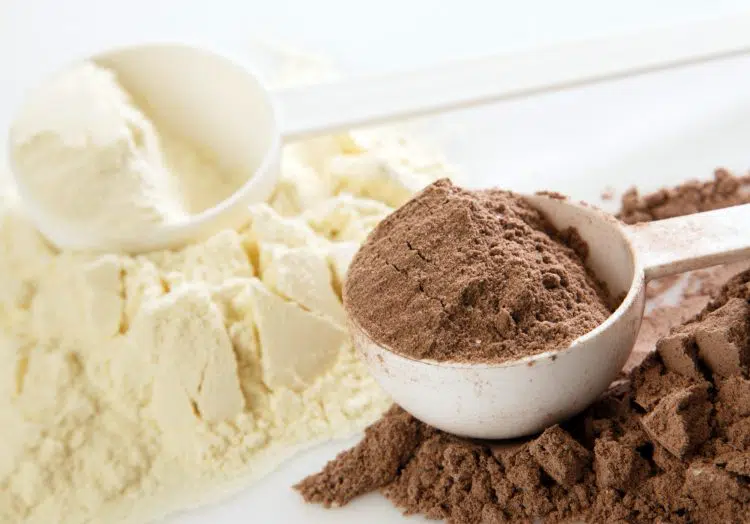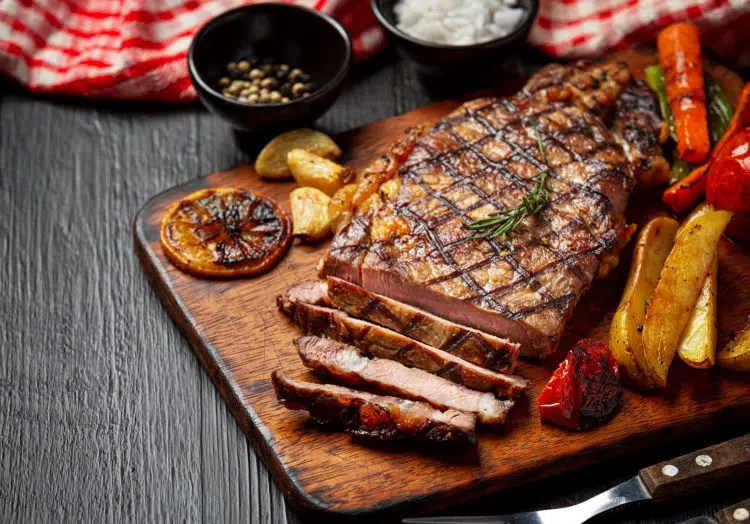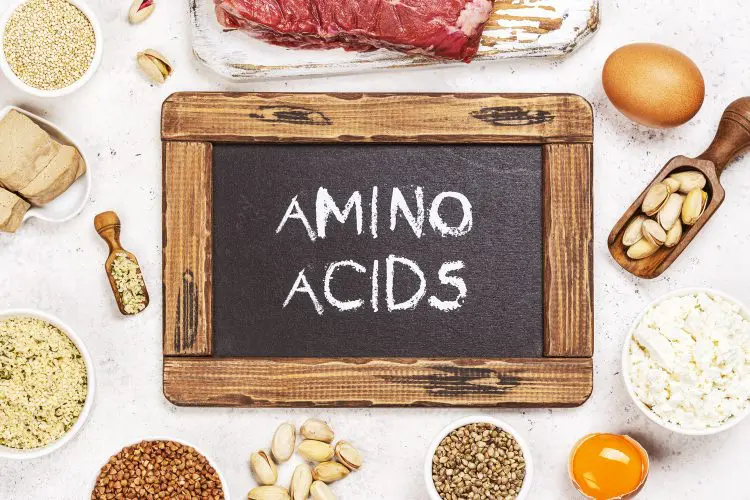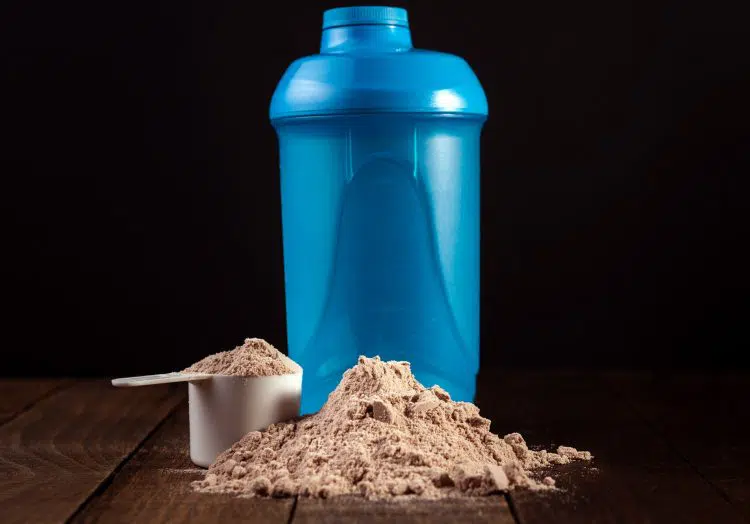Intense training takes a lot out of your body. It depletes your intramuscular glycogen stores, can lead to dehydration, and causes microtrauma to your muscles. While all of these things may sound worrying, they’re actually the first step in the process of building bigger muscles.
After your workout and given enough rest and the right nutrients, your muscles super-compensate and bounce back bigger and stronger. That way, your next workout won’t be so traumatic.
Of course, smart lifters increase the intensity of their workouts to trigger this cycle all over again, resulting in continued muscle growth.
However, as well as needing carbohydrates to restore depleted glycogen and hydrating fluids to replace lost sweat, your body needs protein to repair and build muscle tissue.
Protein contains amino acids which are basically the building blocks of life. Your body uses amino acids like a construction worker uses bricks. Not getting enough protein could severely undermine your muscle-building progress.

Level Up Your Fitness: Join our 💪 strong community in Fitness Volt Newsletter. Get daily inspiration, expert-backed workouts, nutrition tips, the latest in strength sports, and the support you need to reach your goals. Subscribe for free!
Because of this, most bodybuilders not only eat plenty of protein-rich foods, but they also use supplements to make sure they meet their protein needs.
There are several different types of protein supplements, including:
Of these protein supplements, whey is the most popular, but beef is also gaining a following. In this article, we compare whey with beef protein and reveal if one is better than the other.
What is Whey Protein?

Whey is a high-quality protein made from cow’s milk. Cow’s milk contains two types of protein (whey and casein), and they are separated in the process of making cheese. Whey is then strained and dried to make a powder.
Like all good sources of protein, whey is high in essential amino acids and is highly digestible. It’s also easy to flavor, which is why most whey protein shakes taste pretty good.
There are several types of whey protein, with the main three being:
- Whey protein isolate – the purest form of whey protein
- Whey protein concentrate – also contains varying amounts of carbs and fat
- Whey protein hydrolysate – predigested for even easier digestion
Most protein supplements contain a blend of these different types of whey, although you can buy them individually, too.
Despite being made from milk, whey protein supplements are relatively low in lactose. However, most whey protein supplements still contain trace amounts which may prove problematic for anyone with a dairy allergy or lactose intolerance.
Related: Awesome Whey Protein Powders Reviewed.
What is Beef Protein?

Compared to whey protein, beef protein is the new kid on the block. Of course, bodybuilders have been bulking up on steak forever, but protein powder made from beef is a relatively recent development.
Beef protein is made from two ingredients: beef protein isolate and hydrolyzed gelatin. Hydrolyzed gelatin is basically collagen. Most beef supplements don’t contain a lot of actual meat but, instead, are made from things like the hooves, ligaments, hides, and ears of cattle. They are rendered and processed to extract the collagen and then dried and powdered to make beef protein powder.
This is a little misleading because many beef protein users believe they are consuming the supplement equivalent to powdered steak. That is clearly not the case.
Like whey, beef protein contains all the essential amino acids your body needs for muscle repair and growth.
Related: Best Beef Protein Supplements Reviewed.
Whey vs. Beef Protein – Biological Value
Proteins vary in digestibility, and that digestibility can be measured. Scientists use several different scales to rank protein digestibility, including the Net Protein Utilization (NPU) scale, Protein Digestibility Corrected Amino Acid Score (PDCAAS), and Biological Value (BV) scale (1).
Of these methods, Biological Value, also known as the bioavailability index, is the scale most used with supplements. That’s not because it’s the most accurate. It’s more because BV is the easiest to understand.
BV ranks protein foods on a scale of 1-100:
| Protein | Biological Value |
| Egg | 100 |
| Whey | 100 |
| Soy | 100 |
| Beef | 0.92 |
| Pea | 0.90 |
| Rice | 0.42 |
So, according to BV, beef is about 8% less digestible than whey. While this is only a small difference, it means that whey is slightly superior from a BV perspective. If you consume 100 grams of why protein, your body will use all 100 grams. In contrast, if you consume the same amount of beef protein, your body will only be able to utilize 92 grams. The remaining eight grams are “lost” in the digestive process.
Winner: Whey
Whey vs. Beef Protein – Amino Acids

As mentioned earlier, amino acids are the building blocks of life. Your body takes the amino acids in protein and uses them for muscle repair and growth and a host of other functions. Both whey and beef are complete proteins, which means they contain all of the nine essential amino acids. These are:
- Histidine
- Isoleucine
- Leucine
- Lysine
- Methionine
- Phenylalanine
- Threonine
- Tryptophan
- Valine
When you consume all nine essential amino acids, your body can then synthesize the remaining 12 non-essential or conditionally essential amino acids:
- Alanine
- Arginine
- Asparagine
- Aspartic acid
- Cysteine
- Glutamic acid
- Glutamine
- Glycine
- Ornithine
- Proline
- Serine
- Tyrosine
Proteins contain varying amounts of amino acids, and, in general, more is better. That’s especially true for the so-called branched-chain amino acids, which play a crucial role in muscle growth and repair.
Level Up Your Fitness: Join our 💪 strong community in Fitness Volt Newsletter. Get daily inspiration, expert-backed workouts, nutrition tips, the latest in strength sports, and the support you need to reach your goals. Subscribe for free!
The amino acid breakdown per 100 grams of whey vs. beef protein looks like this:
| Amino acid | Whey | Beef |
| Alanine | 4 | 8.8 |
| Arginine | 1.43 | 7.3 |
| Aspartic acid | 8.78 | 6.2 |
| Cysteine | 1.83 | 0.5 |
| Glutamic acid | 13.57 | 11.3 |
| Glycine | 1.43 | 20.1 |
| Histidine | 1.3 | 1.2 |
| Isoleucine* | 4.7 | 1.7 |
| Leucine* | 8.09 | 3.9 |
| Lysine | 6.87 | 5.1 |
| Methionine | 1.74 | 1.2 |
| Phenylalanine | 2.3 | 2.3 |
| Proline | 4.26 | 11.1 |
| Serine | 3.52 | 3.4 |
| Threonine | 5.35 | 2.1 |
| Tryptophan | 1.43 | 0.3 |
| Tyrosine | 2.35 | 0.9 |
| Valine* | 4.48 | 2.8 |
* Branched-chain amino acid
Note: neither whey nor beef protein contains the amino acids asparagine, glutamine, or ornithine.
Whey and beef contain plenty of essential and non-essential amino acids. However, whey has considerably more of those all-important branched-chain amino acids that your body needs for muscle growth. This means that, potentially, whey protein is better than beef protein for hypertrophy.
Winner: Whey
Whey vs. Beef Protein – Fat and Sugar Content

Even the purest protein supplement contains at least trace amounts of the other macros, namely fat and carbohydrate. The carbs are usually in the form of sugar. While these additional food groups don’t make up much of the weight of most protein supplements, some people may still prefer products that are mostly protein.
Whey is made from milk and contains varying amounts of sugar and fat. In contrast, beef protein tends to be lower in carbs and fat and is closer to being pure protein.
If you are dieting for weight loss and counting every calorie, you may find that you can get more grams of protein for fewer calories if you consume beef protein and not whey. However, you’ll still need to check the nutrition label to confirm your macros, as products can vary.
Winner: Beef
Whey vs. Beef Protein – Allergies and Intolerances
A large percentage of the population is lactose intolerant. Some people are even allergic to lactose. Lactose is a sugar found in milk and other dairy foods. It can cause stomach bloating, digestive upsets, and other unpleasant side effects.
Because they are made from milk, whey protein supplements usually contain lactose. In contrast, beef protein is 100% lactose-free.
Whey protein isolate is lactose-free, but it’s also more expensive than regular concentrate or hydrolysate.
Related: Best Lactose-Free Protein Powders.
Remember, though, beef protein is an animal product, which means it isn’t suitable for vegetarians or vegans. That said, some vegetarians may also avoid whey, as it is also made from animals. However, some less-strict vegetarians may be happy with whey because no animals are killed to make it. That’s especially true for whey protein made from free-range, organic, grass-fed cow’s milk.
Winner: Beef (unless you are a vegan or vegetarian)
Whey vs. Beef Protein – Price
Whey protein is one of the most established supplements in the world. It’s been around for years. Made from milk, which is relatively cheap, whey protein supplements are generally very affordable. That’s especially true if you buy whey concentrate or products that contain a whey protein blend.
Beef protein is a newer product with less of a proven track record. It’s also made by rendering animal parts, which means it’s more expensive to produce. Increased production costs mean that beef protein is generally more expensive than whey.
If you are on a budget, whey protein will probably be more affordable than beef protein. Also, because whey has a higher BV than beef, each serving provides more useable protein, making whey even better value for money.
Winner: Whey
Whey vs. Beef Protein – Texture and Taste
Whey protein blends easily. In fact, you can combine it with water just using a shaker cup to make a smooth, lump-free protein shake. Whey protein is also available in lots of different flavors, from the usual chocolate, strawberry, banana, etc., to more exotic flavors, like birthday cake, mocha, and mint-choc-chip.
Beef protein doesn’t usually mix as well. This is not an issue if you use a blender to make your protein shakes, but it could be a problem if you use a shaker cup. You may find that some of your beef protein powder remains undissolved. Beef protein is also available in various flavors. Still, there is no hiding its unmistakable animal origins, which gives it a unique taste. It’s not unpleasant, but it’s not quite as nice as whey protein.
Winner: Whey
Wrapping Up
On paper, at least, it looks like whey is the winner of the protein wars. It has a higher biological value, contains more of the most essential amino acids, tastes better, and is usually cheaper.
Beef protein is better for people with lactose issues and tends to be lower in carbs and fats than whey. However, the less pleasant taste and higher cost mean that, for some people, it’s a less attractive supplement.
But, before you write off beef protein, it’s worth noting that, in studies, whey and beef both performed similarly well for increasing muscle mass and improving body composition (2). It seems that, while there ARE nutritional variances between whey and beef, they may not be all that significant in the real world.
So, despite their differences, it seems that both whey and beef protein can help you reach your training goals. As is often the case, your best option is to try both of them and see which one works best for you.
References:
1 – PubMed: The Biological Value of Proteins https://www.ncbi.nlm.nih.gov/pmc/articles/PMC1266679/?page=3
2 – PubMed: Does Beef Protein Supplementation Improve Body Composition and Exercise Performance? A Systematic Review and Meta-Analysis of Randomized Controlled Trials https://www.ncbi.nlm.nih.gov/pmc/articles/PMC6628355/














